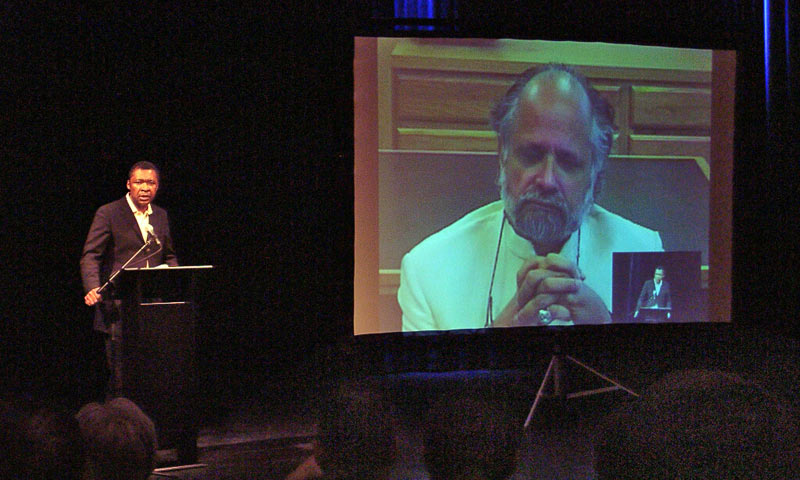Für eine optimale Ansicht unserer Website drehen Sie Ihr Tablet bitte horizontal.
8. Juni - 15. September 2002
Kassel, Deutschland
Künstlerischer Leiter: Okwui Enwezor
Ko-Kuratoren:
Carlos Basualdo, Ute Meta Bauer, Susanne Ghez, Sarat Maharaj, Mark Nash, Octavio Zaya
Mit der 11. Edition wurde eine documenta (die alle fünf Jahre stattfindet) erstmals von einem außereuropäischen Kurator geleitet, dem ein internationales Kuratorenteam zur Seite stand. Sie gilt als die erste documenta mit einer tatsächlich globalen, post-kolonialen Perspektive.
Als eine grundlegende Erweiterung des traditionellen Formats der documenta fanden von März 2001 bis März 2002 auf vier Kontinenten transdisziplinäre Plattformen statt. Dabei handelte es sich um öffentliche Diskussionen und informelle Vorträge zu verschiedenen Themen der Kunst, Politik und Gesellschaft. Die fünfte und letzte Plattform war die Ausstellung in Kassel mit Arbeiten und Projekten von 117 Künstlerinnen, Künstlern und Gruppen, von denen viele über die zuvor erörterten Fragen von globaler Bedeutung reflektierten.
Unsere Auswahl an Kunstwerken von 2002 ist vor allem an der erweiterten Perspektive der documenta 11 orientiert, denn der Fokus auf den "Globalen Süden" war seit dem Start von Universes in Universe Anfang 1997 ein grundlegender Teil unseres Konzepts. Im Jahr 2019 haben wir unser documenta 11 Special neu veröffentlicht, nunmehr auch optimiert für mobile Geräte und mit größeren Bildern.

Okwui Enwezor und Homi Bhaba, Platform 1, Berlin, 2001
© Foto: Haupt & Binder, universes.art
Wien, 15. März - 20. April 2001
Berlin, 9. - 30. Oktober 2001
"Even if democracy has been the watchword for different kinds of participatory governance and political systems of the last half century, to a large degree it remains a project under constant reinvention. The notion unrealized alluded to in the title of this project is a way to interpret the varied modifications that the ethic of democracy and its institutional forms have undergone and continue to undergo today, making democracy a fundamentally unrealizable project, or put another way as a work in progress." In his introductory words, Okwui Enwezor also describes the issues requiring particular consideration:
- Exploring the Term Unrealized
- The End of History, Emergent Democracies, Unstable Democracies
- Tolerance
- Work Ethic
- Development Ethics, Globalization and Democracy
Transitional Justice and the Processes of Truth and Reconciliation
Neu-Delhi, Indien, 7. - 21. Mai 2001
Conference bringing together about 30 participants, incl. historians, legal scholars, film makers, visual artists, psychoanalysts, curators, anthropologists, art historians and theater makers. A video and film program featured 35 films by 26 directors.
The platform's intention was "to examine not only the central arguments that form the core of the juridical and social methods of Truth Commissions as they pertain to state crime and violence; it also argued for a sober reflection on other complex conflicts (ethnic, racial, religious, and sectarian) that are seen as extra-territorial and marginal to the discourse of the search for truth and reconciliation."
Saint Lucia (Karibik), 13. - 15. Januar 2002
This platform took the form of a closed workshop bringing together linguists, literary and cultural theorists, philosophers, writers and artists to whom the notion of Creoleness is a challenging notion.
The discussions revolved around three main themes: Creolité and Creolization; Modernity, Urban Culture and Creoleness; Language and Creoleness.
Vier afrikanische Städte: Freetown, Johannesburg, Kinshasa und Lagos
Lagos, Nigeria, 16. - 20. März 2002
The introductory text highlights, among the aims of this platform, "to examine the vital place of these cities in the political, social, and cultural economy of the region and focus on the nature of their social destabilization whether from war, crime, urban decay, AIDS, and population explosion. But more than serving as testament for further deracination of the African continent, the conference will also be concerned with the analyses of how to reinvent the urban imaginaries of these cities as places that still hold great potential for human vitality, creativity, and inventiveness."
8. Juni - 15. September 2002
Orte: Museum Fridericianum, documenta-Halle, Kulturbahnhof / Balikino, Binding-Brauerei, Orangerie, Karlsaue, Kasseler Innenstadt / Nordstadt
117 Künstlerinnen, Künstler und Gruppen
Die Ausstellung in Kassel war die fünfte und letzte Plattform, konzipiert von Okwui Enwezor und seinem kuratorialen Team, dem Carlos Basualdo, Ute Meta Bauer, Susanne Ghez, Sarat Maharaj, Mark Nash und Octavio Zaya angehörten.
Viele Kunstwerke und Projekte griffen die Schwerpunkte der vier ersten Plattformen sowie andere Themen von globaler Bedeutung auf. In der documenta-Halle sind vor allem Arbeiten von Künstlerkollektiven und auf Archiven aufbauende Projekte zu sehen gewesen. Die Werke im Fridericianum und in der Binding Brauerei waren großzügig inszeniert, wobei fast jedes einen eigenen Raum einnahm. Im Auepark und in anderen öffentlichen Räumen installierte Arbeiten bezogen sich auf komplexe Fragestellungen, die weit über den Kontext ihrer skulpturalen Anziehungskraft hinausgingen.
Platform6
Am 29. April 2021 startete das documenta archiv Platform6, eine virtuelle Plattform zu Ehren von Okwui Enwezor. Das dynamisch wachsende Online-Projekt soll ein Ort der lebendigen Debatte über die Documenta11 und die Aktualität ihrer Diskurse sein.
Mehr Infos und Zugang ►
documenta & Museum Fridericianum Veranstaltungs-GmbH
Friedrichsplatz 18
D-34117 Kassel, Deutschland
Tel.: +49 561 70727-0
FAX: +49 561 70727-39
Lage auf der Karte